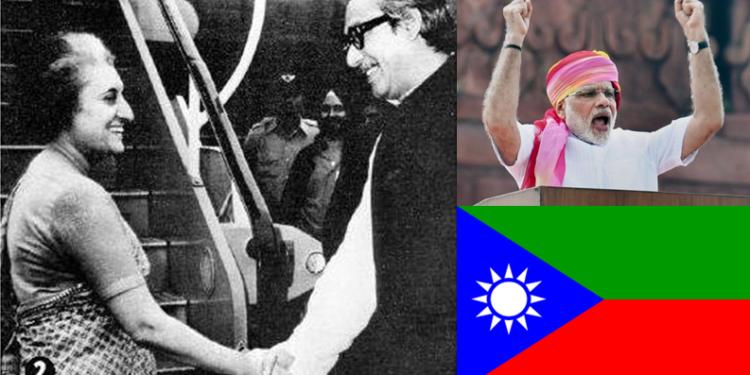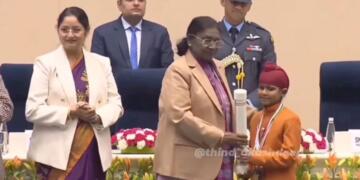Holocaust is widely regarded as a symbol of insanity and subtly a synonym of genocide. Undoubtedly this attempted ethnic cleansing received the flak it deserved. However, comrade Stalin who eliminated his dissidents via purges is said to have killed more than what Hilter could manage in gas chambers, but escaped that prism of brutality which the chieftain of Nazism had unceremoniously acquired. History unfortunately sometimes becomes selective even if events more or less belong to the same page. Genocides may make mention but some are lost into the pages of history or a memory.
‘Children of war’, a movie which portrayed that long lost forgotten side of 1971 war conceiving Bangladesh was an elaborate see through of a genocide . A daring saga of brutality, it tries to brush our mind to the excesses of the Pakistani military in East Pakistan then which somewhere failed to capture attention that should have necessitated by history. As we dwell upon memories of 1971, so does a bundle of things that were associated with it. The atrocities perpetuated by West Pakistan then in now Bangladesh sparked an uprising which culminated into an Indian intervention, a subsequent conflict and ended with creation of a new state.
This Independence day, Prime Minister Modi raised the bogey of Balochistan from the ramparts of the Red fort triggering reactions and sparking speculations. Widely perceived as a counter weight argument or counter balance to Pakistan’s Kashmir rhetoric, his reference may exhibit a strategy. As the podium to address the nation had a twist, that glaring question compounded a variety of possibilities. The best of the lot was instantaneously juicy and the one I loved to frame was ‘ Is Balochistan seemingly on the way to become the next Bangladesh’?
East and West Pakistan like separated east west side of a station with India as a platform were easy to break away. When Balochistan is taken into consideration, it happens to be on the same side landlocked by its dominating cousin provinces and iron fist.
Balochistan has a sweeping undercurrent of similarity with Bangladesh in lieu with the treatment meted out to its people and the mass rumbling that has consistently emanated out of the same. 1971 was the result of a series of systematic mass persecution of ‘Bengali Muslims’ (somewhere connected to linguistic reasons) and minorities who were viewed under the purview of being second class citizens. Shias, Zikris and minorities have faced the same ire in Baloch which has been instrumental in sparking four bouts of insurgency in the region with the latest being from 2003.
As a matter of fact, according to human rights commission of Pakistan itself, certain ethnic groups and minorities have been targeted resulting in mass migrations. Military and paramilitary abuses have used the policy of ‘pick and dump’ where intellectuals, activists and students have been killed or disappeared. This may be a subtle mini replica of the mammoth of an operation searchlight carried by West Pakistani armed forces against east which was a clandestine purge operation carried on a large brutal scale.
Any form of an insurgency has the foundations of lack of development, poverty, economic inequality and a step motherly treatment incorporated by the ruling dispensation. Balochistan is deemed as a neglected province with a seething lack of basic amenities amongst the majority contributing to highest poverty in Pakistan. Under development is prevalent and Baloch separatists along with political parties have echoed similar sentiments that were laid then in east Pakistan which was reeling under an impoverished attire at the behest of an exploitation from the west. Awami League that won elections resoundingly was on this plank that ‘West was built at the expense of the east’ which later became the centre of the surge. The new wave of insurgency established early in the millennium has set political class in the region calling for autonomy and independence which echoes the same sentiment of its erstwhile divided cousin.
Intertwined with lack of development lies the lopsidedness in the way resources are been used for the benefit of the region which has a marked resemblance to the way East Pakistani leaders had opined. Natural resources are the bed rock of Balochistan and so was that of erstwhile Bangladesh. The colonial mindset of the ruling elite then and now has sowed similar seeds of discontent. Balochistan is rich in natural gases but then it’s exploited on the basis of taxes, low royalties and no concurrence of returns with respect to infrastructural output deeming it being heavily in debt. A recent flashpoint has been the construction of Gawadar port in collaboration with the Chinese and the lucrative 46 billion dollar investment which is seen as hogwash to promote development of the region in the wake of strategic interests.
Even if different forces are pushing Baloch uprising ahead, political will, its mobilisation and direction form the core of any movement or uprising. Turmoil and suppression witnessed in 1971 is also visible here may be in traces. Awami league founded as an alternative to Muslim league winning the elections in Dhaka and the impact of its six point movement calling for greater control steered the liberation and formation of Bangladesh. Political activity in Balochistan seemingly is anti-establishment with many players vouching for a greater autonomy beginning with something like Baloch national front which is a conglomeration of nationalist groups co habited with armed insurgency like the Balochistan liberation army. The later like Irish republican army is designated as a terror group and banned or curbed by agencies in Pakistan.
As these driving elements become those wheels that carry the vehicular movement of sorts on its shoulders, the drive or that push to secure its cherished breakaway has to be catalysed by external forces. Like the Northern alliance army was awaiting American intervention which gave impetus to its fight against Taliban, that invisible hand of a support becomes a crucial factor in such situations.
How does an active role by India can help in expediting this process? When Pakistan was cruelly crushing the popular movement in Dhaka, the Indian government led by a resurgent Mrs Gandhi intervened which became a pivotal point in carving Bangladesh and breaking the neighbour into two pieces. So as we comprehend the Baloch tangle, two events have kick started unanimously to subject the crisis in to an all-out issue.
The appeal by Brahumdag Bugti who heads the Balochistan republican party main staying in calling for regional autonomy and Baloch independence has appealed for a political asylum in India. This development replicates Dalai Lama who patronised India as a mother ship base of sorts to shape his Tibetan upsurge.
Although the scale of resistance in Balochistan may be at a nascent level the quest for pushing in for seriousness Is seen in the second reason that complements the Prime Ministers mention of Baloch itself on the occasion of the Independence Day. This will hopefully be patterned at other ceremonious forums that will take the hidden horror stories of Balochs atrocities into the midst of discussions and spotlights in the diplomatic circles and international community.
Indian efforts can begin with robust diplomacy in isolating Islamabad over human right violations in Balochistan which will act as a counter strike to Islamabad’s Kashmir Alaap.
This can be followed by commandeering the stir by granting asylum to ‘freedom fighters’ along with covertly facilitating arms and operations. The churning of these supporting facets will flare up the situation and in the right environment can be subjugated or coaxed into a Bangadesh situation of sorts.
The west including America ( with its anti-Indian duo of Nixon Kissinger) which looked the other way then in 1971 perhaps may look at this issue afresh from a different angle. Although the state department has already called for a united Pakistan post Modi statement, carving out an independent Balochistan may just be even in their strategic interests. Another moderate Islamic country might be created between a Sunni state of Pakistan, Shia Iran and the chaotic militancy infested province of NWFP that may give it a point of stability and boost in curbing the tide of terrorism in the region. This time around, American Indian bilateral relations too are strong to provide that impetus to facilitate such a scenario if required which will invite further fragmentation of the map of Pakistan.




























